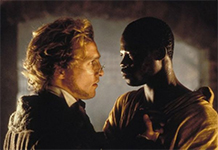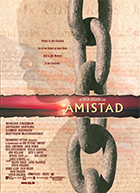Amistad
|  The 1839 Amistad Mutiny, the focus of Steven Spielberg’s Amistad, is an historical event few Americans are aware ever happened, even though it had a profound impact on American history, especially in terms of the eventual destruction of slavery. As with his Oscar-winning Schindler’s List (1993), Spielberg is dealing with one of the most atrocious aspects of recorded human history; however, while he gave powerful visual and narrative voice to the Jewish experience of the Holocaust in the previous film, in Amistad he gives little time to the African experience of slavery. Save a grueling middle sequence that recreates with horrifying detail the “Middle Passage”—the rounding up of Africans and their animal-like shipment across the Atlantic—there is not enough attention paid to the slavery experience. Instead, the majority of the film takes place in ornate courtrooms, with lawyers arguing the legal technicalities of the Africans’ origins and whose property they are. While this may be historically accurate, it doesn’t make for particularly compelling cinematic drama. The 1839 Amistad Mutiny, the focus of Steven Spielberg’s Amistad, is an historical event few Americans are aware ever happened, even though it had a profound impact on American history, especially in terms of the eventual destruction of slavery. As with his Oscar-winning Schindler’s List (1993), Spielberg is dealing with one of the most atrocious aspects of recorded human history; however, while he gave powerful visual and narrative voice to the Jewish experience of the Holocaust in the previous film, in Amistad he gives little time to the African experience of slavery. Save a grueling middle sequence that recreates with horrifying detail the “Middle Passage”—the rounding up of Africans and their animal-like shipment across the Atlantic—there is not enough attention paid to the slavery experience. Instead, the majority of the film takes place in ornate courtrooms, with lawyers arguing the legal technicalities of the Africans’ origins and whose property they are. While this may be historically accurate, it doesn’t make for particularly compelling cinematic drama.The film opens with a bloody massacre aboard the Spanish slave ship La Amistad. Led by Cinque (Djimon Hounsou), 44 African slaves break free of their shackles below deck and attack the sailors during a vicious storm (the powerful manner in which Spielberg melds the violence of nature with the violence of the rebellion makes this opening the film’s most compelling sequence). All but two of the sailors are killed, and the slaves order them to sail back to Africa. Instead, they sail up to Long Island, where the slaves are immediately taken into custody on charges of murder, although the eventual legal wrangling comes down to issues of ownership. Eleven-year-old Queen Isabella of Spain (Anna Paquin) claims the slaves belong to her country under a 1775 treaty; the two living Spanish sailors claim the slaves belong to them; and the American Navy captain who intercepted the ship says they belong to him. The case is taken up by a real estate lawyer named Roger Sherman Baldwin (Matthew McConaughey, wearing tiny specs and big mutton chops). Working with two fictional abolitionists, Georgian ex-slave Theodore Joadson (Morgan Freeman) and the self-righteous Lewis Tappan (Stellan Skarsgard), Baldwin works the case successfully all the way to the Supreme Court, where he is given aid by crusty and gnarled ex-President John Quincy Adams (Anthony Hopkins). Behind the scenes, the current President Martin Van Buren (Nigel Hawthorne) is seeking re-election, and the entire episode is causing him considerable political discomfort. While costume dramas are often difficult to pull off without feeling stuffy and staid, Spielberg’s visual dynamism helps energize the talkiness; visually, Amistad is as beautiful and well-crafted as any of his earlier efforts. The cinematography by Janusz Kaminski (just as proficient in color as he was in black and white in Schindler’s List) is stunning, especially in the opening segment depicting the violent mutiny. The production design by Rick Carter (Forrest Gump) and the costumes by Ruth E. Carter (Malcolm X) are likewise superb, bringing the reality of life in 1839 to the screen in bold colors and bright detail. But, then there’s the whole race issue. In an article in Entertainment Weekly, screenwriter David Franzoni said he tried to avoid what he terms “unintentional racism.” In other words, he didn’t want to follow in the footsteps of films like Ghosts of Mississippi (1996) or A Time to Kill (1996)—the latter of which also features McConaughey as a lawyer—in which white characters are redeemed by saving wronged black characters, but that’s a tough hurdle in a film the majority of which consists of white men arguing with other white men for the black men’s freedom. Franzoni and Spielberg attempt to address the imbalance by making Cinque a major player in the story, having him work hand-in-hand with Baldwin and Adams, which gives him some power in his own salvation. In fact, he is arguably the most well-developed character in the film, much more defined than McConuaghey’s lawyer or Freeman’s abolitionist. It also helps that Spielberg depicts the Africans of the Sierra Leon in truthful detail, allowing them to speak their native language of Mende throughout the entire film (remember that in Schindler’s List all the characters, whether German, Austrian, or Polish, speak English for the convenience of the American audience). As would be expected from its impressive cast list, Amistad benefits from good performances. While established actors like Hopkins and Freeman are notable, it is the almost unknown Hounsou who makes the deepest impression. Hounsou’s incredible performance shows Cinque as a strong man who stumbled into his leadership position, struggling to understand the quagmire of legal ramblings in which he finds himself. It isn’t hard to understand his agony when he wins the his case not once, but twice, only to be told by Baldwin that Van Buren, fearing the loss of his re-election due to pressure from the South, has appealed the case to the Supreme Court. Cinque can’t understand why his case has to be tried over and over again when he’s already won. “What kind of place is this?” he cries out, a stark reminder, lest we forget, of how sordid the darker corners of American history really are. But, by the time the film finally draws to its climax at the Supreme Court, there is little excitement left because, like Cinque, we feel like we’ve been through this case one too many times already. John Quincy Adam’s speech, delivered with all the force and conviction we would expect from Anthony Hopkins at his scenery-chewing best, is eloquent and pointed, but its message of freedom and decency for all human beings has been told many times before. Like the film itself, there is great virtue in his words, but not enough life. Copyright © 1998 James Kendrick |
Overall Rating: 

 (2.5)
(2.5)


